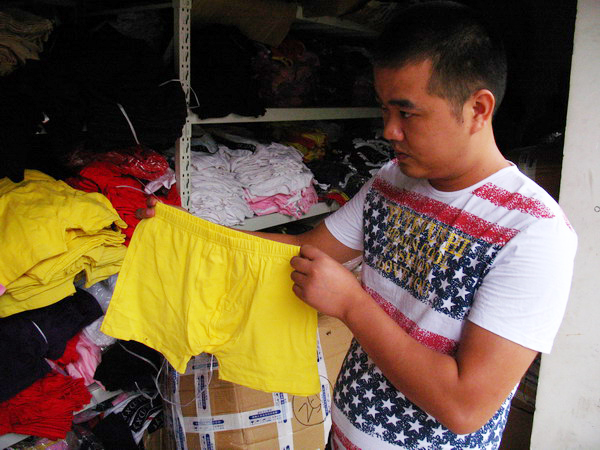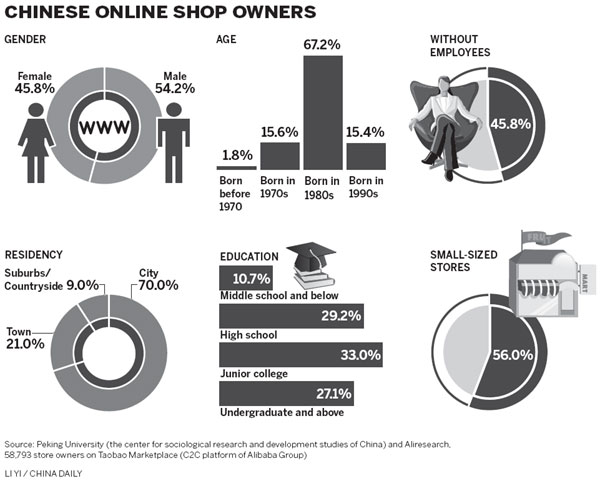The meetings help owners improve their management skills and selling techniques and even help them find supplies, he says.
Last year Wang sold goods worth more than 800,000 yuan. This year he reached that figure in July.
Apart from the income, he also enjoys the freedom of his current job.
"I do not have to report to any government departments or pay taxes. I am totally on my own."
For Xie Zuoshou, the owner of BJ Mall, an online underwear store, the advantage of Qingyanliu is the market information to be found there.
|
 Xie Zuoshou, the owner of an online underwear store - BJ Mall, checks shorts in his company at Qingyanliu in Zhejinag province. [Photo / China Daily] |
"Almost all the owners selling similar products know each other in the village. We drink and have dinners together and share market information," says Xie, 29.
For example, in July 2009, there was a total solar eclipse. Many owners were talking about buying special glasses so they could watch the eclipse.
"Then we realized that there would be a huge demand for these glasses," says Liu.
In the past three years, the number of registered e-commerce companies had grown rapidly, from 306,000 in 2009, to 590,000 in 2011, while the number of people involved has increased from 450,000 in 2009 to 970,000 in 2011, according to a recent report by the Chinese Academy of Social Sciences and AliResearch Center.
But although many other areas are developing into e-commerce centers, such as Shaji town in Jiangsu province, which is mainly focused on furniture, Liu is confident that Qingyanliu will maintain its position as the best place for startups.
"The other areas do not have the same scale of business as Qingyanliu and they lack a complete industry chain, from printing and advertising to packaging and logistics."
Liu says that the village is creating an online warehouse that should be in operation by the end of the year.
Compared to the online supermarket, the online warehouse will provide additional packing and delivery services. The total investment will be at least 30 million yuan.
"In the future, if people want to start e-commerce companies in the village, they will be able to take care of their business sitting in front of the computer, and leave all the packaging, copywriting, graphic design and logistics to us."
|
 |
However, Liu says that the current structure in Qingyanliu does not accommodate big e-commerce companies and after two years, most of the companies move out of the village because of the limited space for inventory.
"When they become successful some of the companies need a warehouse that is 2,000 sq meters or more, while rooms in Qingyanliu are limited to 100 square meters. So when these companies become successful, they will move out of the village to the industrial parks nearby."
Xie Zuoshou has the same plan.
"Qingyanliu is only an incubation center. But companies aiming at a bigger growth have to move out."
Xie's company made sales of about 17 million yuan in 2011, and he hopes it will be 30 million yuan within two years, so the company will move to a 2,000-sq-m warehouse in Beiyuan Industrial Park Zone in mid-October.
Xie says that the supply chain is of great importance to companies.
"If e-commerce companies want to survive, they have to either cooperate with factories or invest in production."
Previously Xie used to sell products for over 110 factories, but last year he started his own 2,000-sq-m factory in Wenzhou.
"With my own factory, I can better control the supply chain and product quality."
Contact the writers at linjingcd@chinadaily.com.cn
